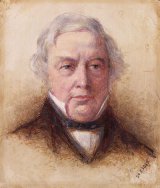Nightmare Abbey Page #9
Nightmare Abbey is an 1818 novella by Thomas Love Peacock, and his third long work of fiction to be published.
MR HILARY Which is about as well employed as the power of a hothouse would be in forcing up a nettle to the size of an elm. If we go on in this way, we shall have a new art of poetry, of which one of the first rules will be: To remember to forget that there are any such things as sunshine and music in the world. THE HONOURABLE MR LISTLESS It seems to be the case with us at present, or we should not have interrupted Miss O'Carroll's music with this exceedingly dry conversation. MR FLOSKY I should be most happy if Miss O'Carroll would remind us that there are yet both music and sunshine-- THE HONOURABLE MR LISTLESS In the voice and the smile of beauty. May I entreat the favour of--(turning over the pages of music.) All were silent, and Marionetta sung: Why are thy looks so blank, grey friar? Why are thy looks so blue? Thou seem'st more pale and lank, grey friar, Than thou wast used to do:-- Say, what has made thee rue? Thy form was plump, and a light did shine In thy round and ruby face, Which showed an outward visible sign Of an inward spiritual grace:-- Say, what has changed thy case? Yet will I tell thee true, grey friar, I very well can see, That, if thy looks are blue, grey friar, 'Tis all for love of me,-- 'Tis all for love of me. But breathe not thy vows to me, grey friar, Oh, breathe them not, I pray; For ill beseems in a reverend friar, The love of a mortal may; And I needs must say thee nay. But, could'st thou think my heart to move With that pale and silent scowl? Know, he who would win a maiden's love, Whether clad in cap or cowl, Must be more of a lark than an owl. Scythrop immediately replaced Dante on the shelf, and joined the circle round the beautiful singer. Marionetta gave him a smile of approbation that fully restored his complacency, and they continued on the best possible terms during the remainder of the evening. The Honourable Mr Listless turned over the leaves with double alacrity, saying, 'You are severe upon invalids, Miss O'Carroll: to escape your satire, I must try to be sprightly, though the exertion is too much for me.' * * * * * CHAPTER VII A new visitor arrived at the Abbey, in the person of Mr Asterias, the ichthyologist. This gentleman had passed his life in seeking the living wonders of the deep through the four quarters of the world; he had a cabinet of stuffed and dried fishes, of shells, sea-weeds, corals, and madrepores, that was the admiration and envy of the Royal Society. He had penetrated into the watery den of the Sepia Octopus, disturbed the conjugal happiness of that turtle-dove of the ocean, and come off victorious in a sanguinary conflict. He had been becalmed in the tropical seas, and had watched, in eager expectation, though unhappily always in vain, to see the colossal polypus rise from the water, and entwine its enormous arms round the masts and the rigging. He maintained the origin of all things from water, and insisted that the polypodes were the first of animated things, and that, from their round bodies and many-shooting arms, the Hindoos had taken their gods, the most ancient of deities. But the chief object of his ambition, the end and aim of his researches, was to discover a triton and a mermaid, the existence of which he most potently and implicitly believed, and was prepared to demonstrate, à priori, à posteriori, à fortiori, synthetically and analytically, syllogistically and inductively, by arguments deduced both from acknowledged facts and plausible hypotheses. A report that a mermaid had been seen 'sleeking her soft alluring locks' on the sea-coast of Lincolnshire, had brought him in great haste from London, to pay a long-promised and often-postponed visit to his old acquaintance, Mr Glowry. Mr Asterias was accompanied by his son, to whom he had given the name of Aquarius--flattering himself that he would, in the process of time, become a constellation among the stars of ichthyological science. What charitable female had lent him the mould in which this son was cast, no one pretended to know; and, as he never dropped the most distant allusion to Aquarius's mother, some of the wags of London maintained that he had received the favours of a mermaid, and that the scientific perquisitions which kept him always prowling about the sea-shore, were directed by the less philosophical motive of regaining his lost love. Mr Asterias perlustrated the sea-coast for several days, and reaped disappointment, but not despair. One night, shortly after his arrival, he was sitting in one of the windows of the library, looking towards the sea, when his attention was attracted by a figure which was moving near the edge of the surf, and which was dimly visible through the moonless summer night. Its motions were irregular, like those of a person in a state of indecision. It had extremely long hair, which floated in the wind. Whatever else it might be, it certainly was not a fisherman. It might be a lady; but it was neither Mrs Hilary nor Miss O'Carroll, for they were both in the library. It might be one of the female servants; but it had too much grace, and too striking an air of habitual liberty, to render it probable. Besides, what should one of the female servants be doing there at this hour, moving to and fro, as it seemed, without any visible purpose? It could scarcely be a stranger; for Claydyke, the nearest village, was ten miles distant; and what female would come ten miles across the fens, for no purpose but to hover over the surf under the walls of Nightmare Abbey? Might it not be a mermaid? It was possibly a mermaid. It was probably a mermaid. It was very probably a mermaid. Nay, what else could it be but a mermaid? It certainly was a mermaid. Mr Asterias stole out of the library on tiptoe, with his finger on his lips, having beckoned Aquarius to follow him.
Translation
Translate and read this book in other languages:
Select another language:
- - Select -
- 简体中文 (Chinese - Simplified)
- 繁體中文 (Chinese - Traditional)
- Español (Spanish)
- Esperanto (Esperanto)
- 日本語 (Japanese)
- Português (Portuguese)
- Deutsch (German)
- العربية (Arabic)
- Français (French)
- Русский (Russian)
- ಕನ್ನಡ (Kannada)
- 한국어 (Korean)
- עברית (Hebrew)
- Gaeilge (Irish)
- Українська (Ukrainian)
- اردو (Urdu)
- Magyar (Hungarian)
- मानक हिन्दी (Hindi)
- Indonesia (Indonesian)
- Italiano (Italian)
- தமிழ் (Tamil)
- Türkçe (Turkish)
- తెలుగు (Telugu)
- ภาษาไทย (Thai)
- Tiếng Việt (Vietnamese)
- Čeština (Czech)
- Polski (Polish)
- Bahasa Indonesia (Indonesian)
- Românește (Romanian)
- Nederlands (Dutch)
- Ελληνικά (Greek)
- Latinum (Latin)
- Svenska (Swedish)
- Dansk (Danish)
- Suomi (Finnish)
- فارسی (Persian)
- ייִדיש (Yiddish)
- հայերեն (Armenian)
- Norsk (Norwegian)
- English (English)
Citation
Use the citation below to add this book to your bibliography:
Style:MLAChicagoAPA
"Nightmare Abbey Books." Literature.com. STANDS4 LLC, 2024. Web. 23 Nov. 2024. <https://www.literature.com/book/nightmare_abbey_48>.




Discuss this Nightmare Abbey book with the community:
Report Comment
We're doing our best to make sure our content is useful, accurate and safe.
If by any chance you spot an inappropriate comment while navigating through our website please use this form to let us know, and we'll take care of it shortly.
Attachment
You need to be logged in to favorite.
Log In